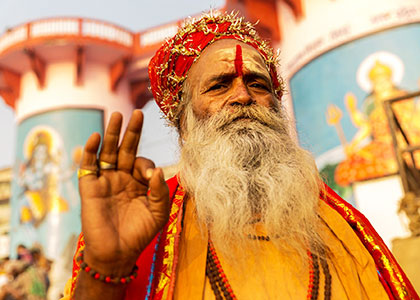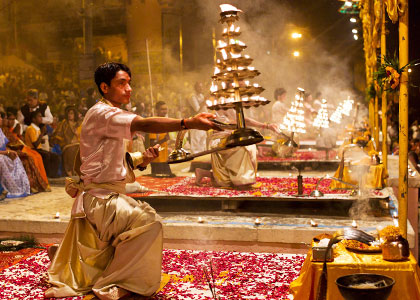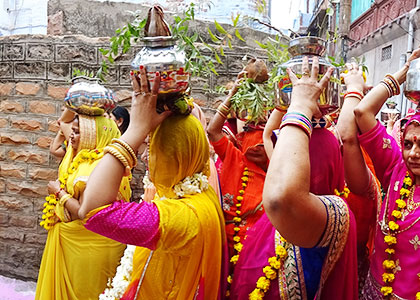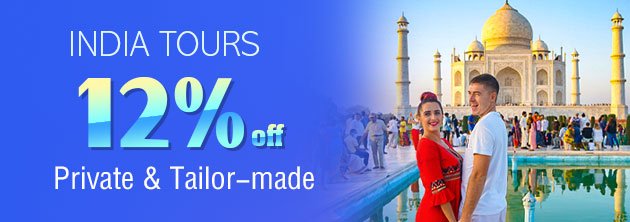India Travel Advice – 5 Dos and 5 Don’ts
India is a religious country with many religions coexist for a long time. Religion permeates all aspects of social life. It is also a unified multi-ethnic country composed of more than 100 ethnic groups. Therefore, there are many taboos when traveling to India. Before you go to India, know some India travel advice may help you understand the local culture and customs in order not to entrap yourselves to danger.India Travel Advice - 5 Dos You Should Follow
1. Do use your right hand to eat.
In northern India, most people eat with tableware, and the containers and cutlery for food are similar to those in other parts of the world. But in South India, it is more common to eat with their hand directly. Whether you choose to use tableware or do as the Romans do, remember this India travel advice to use your right hand unless you are left-handed. Because Indians believe the left hand is unclean.2. Do take medicines for diarrhea and enterogastritis.
Food hygiene problems in India are well known. On the one hand, edible animals in India are not raised up in a clean environment, so people with poor digestive system may not adapt to local meat. On the other hand, the hygiene problems in the food making process are not up to standard, which will also cause more serious food safety problems. Therefore, you should better not eat street food and raw food. It is better to take some commonly used drugs for a rainy day.
|
|
3. Do respect the Indian religious rituals.
India is one of the countries most affected by religion in the world. If you see a religious ceremony, do not judge it arbitrarily. Even if some religious customs look strange, do not make random comments or discuss with local people at will, so as not to cause misunderstanding or even conflict. For example, there are many bathers along the Ganges River, because it is India's mother river. For them, bathing in the Ganges River is a great honor. If you want to take pictures, you need to ask their permission first. And cremation ceremony will be at the Ganges River in Varanasi. In Hindu’s mind, die by the Ganges and scatter the ashes into the river, they can wash away the sin in the whole life.4. Do take the mosquito repellent.
India is a tropical country. Except for the northernmost mountain region, other regions have a high temperature, with an annual average temperature of more than 22℃ (71.6℉). There are a large number of mosquitoes. Mosquito bites can cause severe itching, or dengue fever and other diseases. India has a high incidence of dengue fever, with about 6 million people infected each year. So bear this India travel advice in mind to bring mosquito repellent.5. Do take a pair of rain boots.
Maybe you do not even know why rain boots are so important. Located in the tropics, India has abundant rainfall. The rainy season is from June to September, but it also rains a lot at other times. In addition, many cities in India have poor infrastructure and inadequate drainage systems. When it rains, the streets will accumulate water. And the local streets are not very clean. Imagine that the rainwater is mixed with all kinds of domestic garbage and human and animal excrement. Wearing a pair of rain shoes is definitely a wise move.
India Travel Taboos – 5 Don’ts You Should Remember
1. Don’t wear revealing clothes.
You must take this India travel advice seriously. Do not wear shorts and short skirts when visiting Indian temples. Even in other scenic spots or streets, you should better not wear exposed clothes, especially for female tourists. Do not expose your shoulders and knees, and do not wear bare clothes such as shorts, short skirts and suspenders. Do not wear tight clothes either.2. Don’t drink the tap water.
In addition to the food hygiene problems mentioned above, drinking water hygiene should also be given special attention. The water quality in India is not good enough to be drunk, so do not drink tap water directly, otherwise it is likely to lead to diarrhea. When drinking bottled water, you should also notice that whether the bottle cap has been opened. Tap water is used for washing at most. If you really mind the problem, you can also brush your teeth or gargle with bottled water.
|
|
|
3. Don’t use your left hand to eat or pass things to others.
Do not pass things to the local people with your left hand, because Indians think that left hand is unclean. There is no toilet paper in Indian toilets, and Indians have no habit of using toilet paper. After going to the toilet, they use their left hand to clean, and then wash their hands in the sink nearby. If you use your left hand to communicate with them, they will think that you are provoking them.4. Don’t touch others’ heads.
Indians believe that the head is sacred and inviolable. Due to the traditional Indian culture, please do not touch children's heads, even if you think they are very adorable. They think it is contempt and the greatest insult to their children.5. Don’t eat beef, especially before Hindus.
This India travel advice is also greatly related to Indians’ religious beliefs. Cattle are regarded as sacred animals by Hindus. They are the mounts of the Hindu god Shiva and Saint Nandi. In addition, since agriculture is a traditional industry in India, cattle are used for farming and transportation. In Indian society, which is mainly vegetarian, milk products are the main source of nutrition. Cow dung can be used as fuel and fertilizer. Cow urine is also one of the traditional Indian medicines. Therefore, killing cows has become a taboo in Indian culture. Indians do not eat, whip or hurt cows. You can often see cows roaming in the streets at will. Do not mention beef related topics when traveling to India, and try to avoid using products made from cows as much as possible.
Read More:
10 India Travel Tips that You Have to Read before You Go
Is India Safe? Read the 14 Tips to Save Your Life
9 Special Things to Do in India Only





